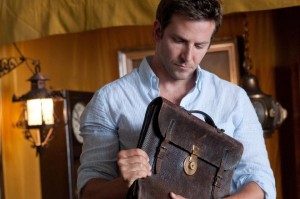
Editor’s note: The Double Take series has been on hold for a while now, but today marks the return of this two-sided format of perspectives. Here, Bill Graham and Andrew Crump both offer their two cents on the freshly released literary drama, The Words.
By Bill Graham:
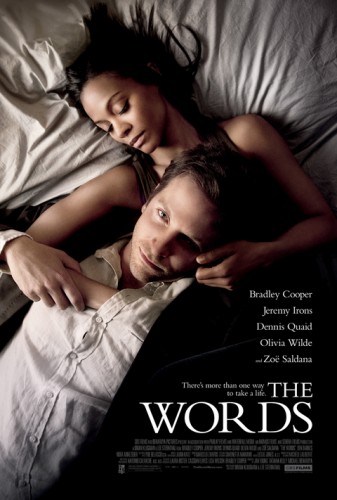 The lesson in The Words isn’t that first-time writer/directors can get in over their heads but that a solid editor might make the difference between a film that gets sidetracked in its own convolution and something worthwhile. The bulk of the narrative plays out with struggling writer Rory Jansen (Bradley Cooper) trying to make ends meet with his wife Dora (Zoë Saldana) rooting him on in their sparse New York apartment. Upon their honeymoon to Paris she buys him a satchel and when he gets back he discovers a hidden manuscript that he falls in love with. His infatuation grows and soon he finds himself in a depressed state because he knows this piece of unsigned work is what he dreams of becoming. Instead of inspiring him, he reluctantly decides to see if it would even get published. When it does, he is past the point of no return.
The lesson in The Words isn’t that first-time writer/directors can get in over their heads but that a solid editor might make the difference between a film that gets sidetracked in its own convolution and something worthwhile. The bulk of the narrative plays out with struggling writer Rory Jansen (Bradley Cooper) trying to make ends meet with his wife Dora (Zoë Saldana) rooting him on in their sparse New York apartment. Upon their honeymoon to Paris she buys him a satchel and when he gets back he discovers a hidden manuscript that he falls in love with. His infatuation grows and soon he finds himself in a depressed state because he knows this piece of unsigned work is what he dreams of becoming. Instead of inspiring him, he reluctantly decides to see if it would even get published. When it does, he is past the point of no return.
That would be enough to fill a film, but writer/directors Brian Klugman and Lee Sternthal have also woven in two other storylines. One follows The Old Man (Jeremy Irons) after he confronts Rory, which audiences justifiably suspect is the one who wrote the novel. That leads to a flashback in which Ben Barnes plays what I assume is The Young Man and we learn a tale of despair and how the novel never came to be. Then there is Clay Hammond (Dennis Quaid) who sits in front of an auditorium and is telling the entire narrative to his adoring fans. One in particular is bold and cunning: Daniella (Olivia Wilde). She is infatuated with him as she gives her best piercing stare that hints at more than just interested conversation.
All of this takes place within a 96 minute runtime and yet the narrative is quite simple. Rory finds an unpublished manuscript, passes it off as his own while enjoying the success it brings, then is caught by the writer of the work. But things gain complexity as the directors weave the storylines together, blurring the lines between fact and fiction. The problem is that they never fully develop the more interesting portions. In fact, it almost seems like they either ran out of time—which is unlikely considering they were the directors—or they simply don’t know where it ends themselves. They spend so much time setting things up and just don’t follow through. The audience I was with let out an enormous groan at the end of the film, and while I did not join their raucous dissatisfaction, I was left just as cold.
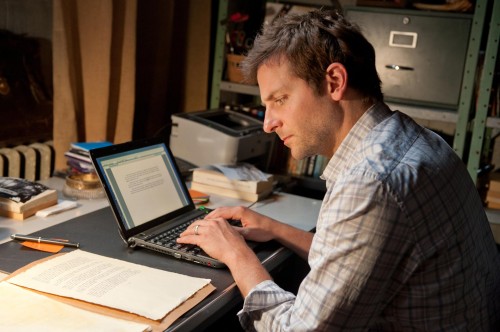
That isn’t to say there is no fun within The Words. On the contrary, this is an old-fashioned piece of filmmaking that seems to focus on the setup more than anything. There are some great characters as well. Quaid’s Clay Hammond is a fascinating picture of pride with insecurity. Daniella catches his attention and he blows off a reporter to make sure he lands his prize. Yet, even she is not whom she may seem. She arrives late to his reading (superfan, huh?), and while she is ready to take things to the next level she also seems to harbor some kind of anger towards him. Then there is the crotchety Jeremy Irons as The Old Man. He is full of great one-liners and he torments Rory with a mixture of contempt and sadness. Yet, none of this can overcome the whimper of an ending. In the right hands, this could have been something lasting. Instead it is just an interesting what-if.
By Andrew Crump:
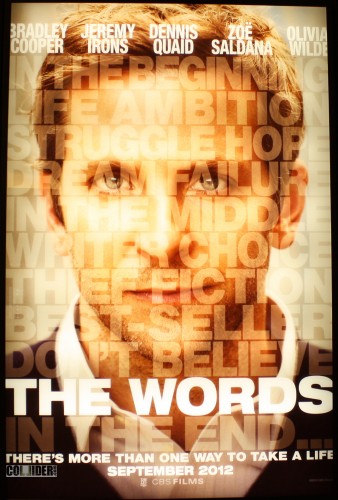 If there’s one great criticism that must be leveled at The Words, it’s that it manages to say nothing worthwhile despite being overwhelmingly verbose and flabby. Unlike, say, Woody Allen’s Midnight in Paris, a film that similarly steeps itself in the literary, The Words mines its own conceit to minimal effect; what phrases or concepts of interest it does muster, it mangles. No single release in 2012 so blatantly and clumsily spells out its intentions as this one, constantly point overtly toward its central “meaning”, which would be a forgivable offense if The Words actually had any substantial intelligence lurking among its numerous, intersecting plot lines.
If there’s one great criticism that must be leveled at The Words, it’s that it manages to say nothing worthwhile despite being overwhelmingly verbose and flabby. Unlike, say, Woody Allen’s Midnight in Paris, a film that similarly steeps itself in the literary, The Words mines its own conceit to minimal effect; what phrases or concepts of interest it does muster, it mangles. No single release in 2012 so blatantly and clumsily spells out its intentions as this one, constantly point overtly toward its central “meaning”, which would be a forgivable offense if The Words actually had any substantial intelligence lurking among its numerous, intersecting plot lines.
Yet the film stubbornly remains thoroughly, amazingly dimwitted throughout its entire running time. There are moments, though few, where Brian Klugman and Lee Sternthal– who wrote and directed the movie together– suggest the possibility of a curve ball, something capable of upsetting the entire narrative they’ve spun and turning it on its head. Regrettably, that never happens, which makes even the slightest hint of subversion something of a frustrating tease. Here, Klugman and Sternthal tell the story of Rory Jansen (Bradley Cooper), a hack writer who desperately wants to realize his dream of becoming a bona fide novelist akin to the Hemingways of the past; he’s not that different from Allen’s Gil Pender, except that Jansen happens not upon a time warp back to 1920s Paris but rather a manuscript for what turns out to be the best story he’s ever read.
The ultimate conflict here arises when Jansen decides to pass off the seemingly authorless work as his own, a move that vaults him to fame and legitimacy but also puts him at odds with the man who actually wrote the damn thing (played by a wonderfully grizzled Jeremy Irons, chewing his way through scenery with gusto). Of course, the film’s great trick is that this isn’t really Jansen’s story; it’s actually the work of Clay Hammond (Dennis Quaid), a massively popular and well-established writer whose latest novel happens to be the very story of Jansen’s deception. And nestled within that dual narrative is Irons’ own tale of love, regret, remorse, loss, and longing. That none of this ever gets confusing should speak to Klugman and Sternthal’s joint credit, but neither man is ambitious enough in the deployment of plot to actually make it confusing. They’re exactly the drudges Jansen is made out to be– after all, in order to make something convoluted to the point of incoherence, one must have vision in the first place.
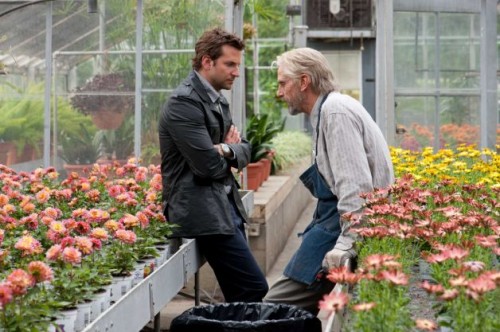
Frankly, the way that The Words imitates reality through sheer nepotism represents its most interesting characteristic. Klugman, by happy coincidence, happens to be friends with Cooper. Is it gauche to imply that their relationship is the most likely catalyst behind the film getting produced in the first place? Just like Jansen turns to the work of a better talent to succeed, so too has Klugman called on his celebrity friend to see his movie made. But that dichotomy doesn’t make The Words interesting. There’s a moment where the film comes close to saying something smart– writers, Hammond tells us, have to choose between fiction and reality– but this profound near-insight is offered with such pat stupidity as to squander any value it could have had. Maybe there’s a thoughtful, meaningful yarn woven somewhere around The Words‘ bones, but it never makes its presence felt in an hour and a half (that feels closer to two) of characters telling us exactly how they feel while relentless voice-overs fill in the spaces between the dialogue.
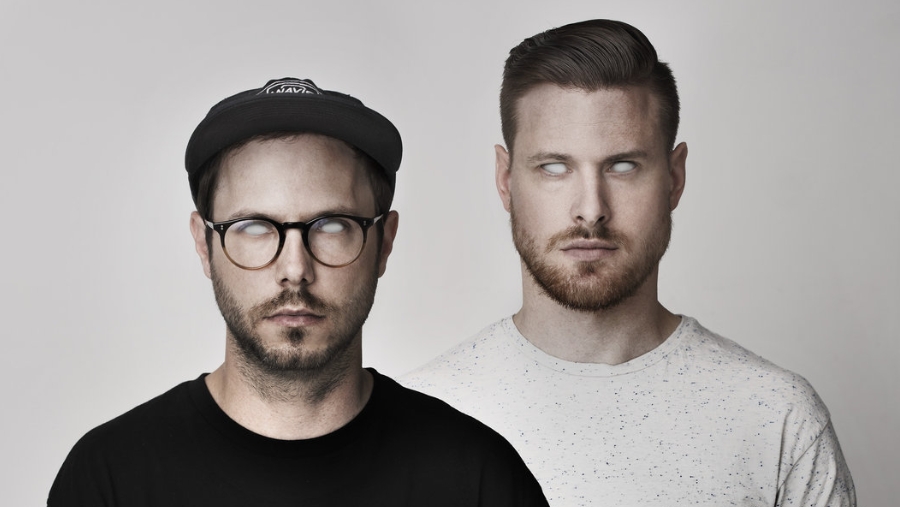
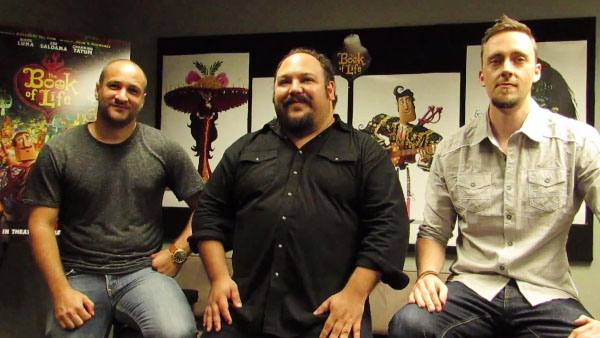
4 Comments
Dan O'Neill
Nice reviews guys. This flick didn’t do much for me except offer a nice reminder as to why Jeremy Irons is the man. He’s a great actor and it’s a shame that the guy doesn’t get bigger roles nowadays other than just showing up from time to time.
Andrew Crump
I enjoyed Irons in here for all the good he could reasonably bring to the story. The real problems here have nothing to do with the acting, though, and I wish Irons had been able to show up to a set for a much better written and directed film.
CastorTroy
Filmmakers that think their movie is much more clever than it really is or maybe, they think audiences are dumber than they really are? Sadly, both are a growing trend in Hollywood it seems. Great reviews, Andrew and Bill
Andrew Crump
Thanks Castor! And yeah, I’ve gotta say I’m not sure if it’s the former or the latter. Either way their movie is awful, though, so I’m not sure how much it matters in the long run.